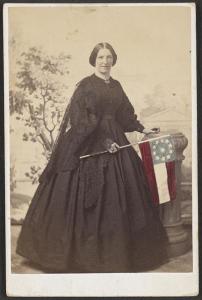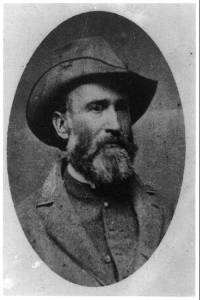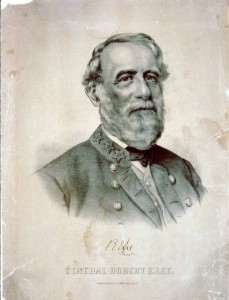Some more Monday morning defiant optimism from the editors at the Richmond Daily Dispatch on September 26, 1864:
Monday morning…September 26, 1864.
That we are approaching a very critical period of our existence as a people in certain. Within one month from the pre[s]ent time we shall once more be subjected to one of those periodical trials to which we have now become accustomed, and which have been on often repeated that they have lost all their terrors. The enemy is about to make another onslaught, with the two-fold object of “crushing the rebellion” and re-electing Abraham Lincoln. The letter is much the more important of the two; the former is but secondary, and designed to aid in bringing about the latter. The opening of the drum is not very encouraging, we admit; yet it is quite as much so as it was last spring, when Jones had been defeated, and Hunter, victorious and without opposition, was making his way triumphantly to Lynchburg. It is not on the flanks of our army that this matter is to be decided. Whatever may happen there, is of second-rate importance. It is here, before Richmond and around Petersburg, that the decision of the question is to be made. For ourselves, we entertain no doubt whatever of the manner in which it will terminate. We place the utmost confidence in the genius of General Lee and the valor of his unrivalled army. We believe that they will be again victorious, as they were last summer in a crisis far more perilous than this. But they must have all the assistance that can be sent to them, and this we doubt not they will have. Let our friends, then, possess their minds in peace, and place their firm reliance on that Providence which has so often shielded them from calamity when it appeared on the point of overwhelming them. For what but the interposition of Providence could have protected our cause thus far against an enemy so far excelling us in numbers and in all the appliances of war?
We are glad to see, at this critical moment, that the spirit of the people is high and defiant. Let disaster come, they are prepared to bear it with fortitude. Let triumph come, they will receive it with moderation. Unlike the degenerate race beyond the Potomac and the Ohio, they neither run made with exultation at every drifting success, nor sink into abject fear whenever defeated. Success and defeat they bear with the same equanimity. Let them be defeated to-morrow; let Petersburg be taken and Richmond razed to the ground or consigned to the flames; still, they are as far from being subjugated as ever. They do not intend to submit, let their disasters be what they may.
But we have not the least fear that either of the catastrophes alluded to will take place. As we have already said, we confide in General Lee and his gallant army to bring us safely out, and we feel no apprehensions of the issue. If Grant failed last May, with an army much larger than that which he has now, and every way its superior, we cannot see any reason why he should succeed now, when the bulk of his army is composed of the very offscouring of mankind; the scum of all the nations; the refuse of the human race, substituted for the tens upon tens of thousands of disciplined veterans that have fallen since he took command. That the job he has undertaken is a most difficult one, he himself makes evident by his call for one hundred thousand fresh troops, after having already expended double that number in the vain attempt to complete it. In all modern history there is no record of any enterprise against a single position having cost so much.–Three hundred thousand tried their hands last summer. To these Grant now wishes to add one hundred thousand more. With four hundred thousand men in a central position, an enterprising monarch, who was likewise a good soldier, could over whelm any monarchy in continental Europe. Yet, with an army of that size, the Yankees have been thus far utterly unable to take this city, far less to conquer Virginia.
As for the reverses of General Early in the Valley, that they are a serious inconvenience to us, we will not deny. But we do deny that they are of such a character that they should discourage us or create a doubt as to ultimate success. Even though that army were captured or destroyed, and we feel no apprehension upon either score, it would not decide the question, as long as Lee was in the field and had a gallant army under his command. That army, at least, has no fear of the issue, so long as the life of their commander is preserved. There is no instance in modern times of greater devotion to a chief than that which the Army of Northern Virginia feel and profess to General Lee. They believe that while he is with them they cannot be beaten. They are proud of his high renown. They know that the laurels which encircle his brow were placed there by their hands; and they will shed the last drop of blood rather than suffer the impure hands of a mercenary leader of banditti — such as Grant, the tool of a tyrant as remorseless and as careless of human life as himself — to tear them from him. Now, this is the feeling which renders soldiers invincible — which made the troops of Hannibal believe that victory was chained to his standard and could not be divorced from it — which enabled Cæsar to say, on a critical occasion, when his army murmured and refused to go forward in a certain expedition, “If you will not go, I will take the Tenth Legion and go with them alone”–which induced Wellington to estimate Bonaparte’s presence on a field of battle as equal to fifty thousand men. No index of a great commander is so little liable to mistake as this capacity of inspiring men with confidence. As long as that army and that general exist, the enemy will not only never conquer the Confederacy, but will not even enter this city as a conqueror. Blood, it is true, must flow like water; but it is blood shed in the holiest of causes, every drop of which is sacred in the eyes of a whole people.
It is the general belief that this will be the last great trial of the enemy — that if this fail he will become tired of throwing army after army into this yawning gulf of ruin and death — that if he be beaten now he will not repeat the experiment.–Whether it be so or not, we think there is very little doubt that the present onslaught is dictated by the near approach of the election, and is, in effect, an electioneering effort. What the result of a defeat may be, we do not undertake to say; but that the attempt to take Richmond will be again defeated, we no more doubt than we doubt our own existence.
“Lee’s Adjutant”, Walter Taylor realized that even geniuses needed enough material to work with as he wrote in a September 25, 1864 letter to his girlfriend while he was still stationed at Violet Bank:
… I thought a good application of the text [of that day’s sermon] might be made to the times, and an excellent read to the croakers who imagine the Confederacy in a desperate strait and are ready to cry “enough” & take the oath. WE are stirring matters up over here & propose to put the whole Bureau of Conscription in the army as a beginning of a great reform – after which we might get some soldiers in the ranks. Whereas now every body procures a detail or exemption. We also propose to make the negroes serviceable & some advocate placing them in the ranks – making soldiers of them – but for this I am not yet quite ready. …
The Gen’l has sent for me. Goodbye.
W … [1]
- [1]Tower, R. Lockwood with John S. Belmont, eds.Lee’s Adjutant: The Wartime Letters of Colonel Walter Herron Taylor, 1862-1865. Columbia: University of South Carolina Press, 1995. Print. page 194.↩



